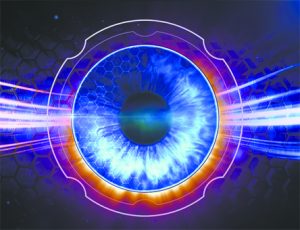 Macular Degeneration is the deterioration of the macula, a tiny area near the center of the retina that enables you to focus on the fine details of close-up tasks like reading and distant tasks like driving. Macular degeneration commonly develops in people ages 50 and older, a condition known as Age-related Macular Degeneration (AMD), which is the most common form of the disease and the number one cause of serious vision loss among older Caucasians.
Macular Degeneration is the deterioration of the macula, a tiny area near the center of the retina that enables you to focus on the fine details of close-up tasks like reading and distant tasks like driving. Macular degeneration commonly develops in people ages 50 and older, a condition known as Age-related Macular Degeneration (AMD), which is the most common form of the disease and the number one cause of serious vision loss among older Caucasians.
Over time, oxidation within the body can lead to the production of atom-damaging elements known as free radicals. The macula is particularly vulnerable to the oxidative stress caused by free radicals, especially as we age; this susceptibility is enhanced by certain actions and conditions, including smoking cigarettes, high cholesterol levels, a family history of AMD, and being of European ancestry.
While most AMD cases progress slowly, some come on rapidly and worsen quickly. Because AMD usually affects central vision only, it doesn’t typically cause total blindness – but left untreated, it can make everyday tasks like reading, watching TV or seeing faces difficult or impossible. As macular degeneration begins to develop, a person may begin to rely more on his or her peripheral vision as central vision begins to blur, or dark or blank spots appear, or straight lines begin to look curved, wavy or skewed. Patients also often report being unable to adjust appropriately to rapid changes in light, as with switching a light on or off.
There are two types of AMD, dry and wet. Roughly 90% of cases are Dry AMD, which is caused by oxidative stress thinning out the macula. With Dry AMD, vision loss is typically slow.
The remaining 10% suffer from Wet AMD, which is caused by the formation of abnormal blood vessels beneath the retina that leak fluid or blood, distorting vision. Wet AMD can cause serious and rapid vision loss.
Diagnosing Macular Degeneration
The vision loss associated with macular degeneration is most often permanent, making an early diagnosis vitally important to sight preservation. A simple test by your ophthalmologist allows him or her to inspect the macula using a specialized lens that provides great detail of the eye’s structures. Your doctor may also take highly sophisticated digital photographs to aid in diagnosis. There is also an easy test called the Amsler Grid, on which you focus your eyes one at a time and report what you see. Your doctor will provide an Amsler Grid for home use so you can easily catch degeneration early, when treatments and medication can be employed to help protect vision from further damage.
Treating and Managing AMD
Some Dry AMD patients may be able to help reduce the risk of disease advancement by taking specific potencies of certain nutritional supplements recommended by your ophthalmologist.
The more serious form, Wet AMD, can be treated using several protocols, depending on factors assessed by your doctor. Although there is no cure for Wet AMD, these treatments may help improve vision or at least help slow or prevent further vision loss.
• VEGF Blockers – VEGF Blockers are specialized drugs that your ophthalmologist injects into the eye to help arrest the growth of abnormal blood vessels beneath the retina by blocking the body’s Vascular Endothelial Growth Factor, or VEGF. This is the most common treatment for Wet AMD and may improve vision in some patients.
• Laser Surgery – Some types of Wet AMD respond to a quick outpatient laser surgery, in which a beam of light is directed at leaking blood vessels to help slow or stop fluid from further damaging the macula. It may be used in conjunction with a drug designed specifically for this purpose.
When to See Your Doctor
Because most people with AMD don’t know they have it until their vision becomes noticeably affected, early diagnosis is key in helping to prevent and arrest vision loss. You should get regular comprehensive eye exams from your Lake Eye ophthalmologist, especially if you’re over 50 or have other risk factors.
Ask your doctor how often he or she recommends that you get a full comprehensive eye exam. With AMD, a little preparation can go a long way toward preserving your vision.
Lake Eye Associates
www.LakeEye.com
352-750-2020
 Central Florida Health and Wellness Magazine Health and Wellness Articles of the Villages
Central Florida Health and Wellness Magazine Health and Wellness Articles of the Villages



